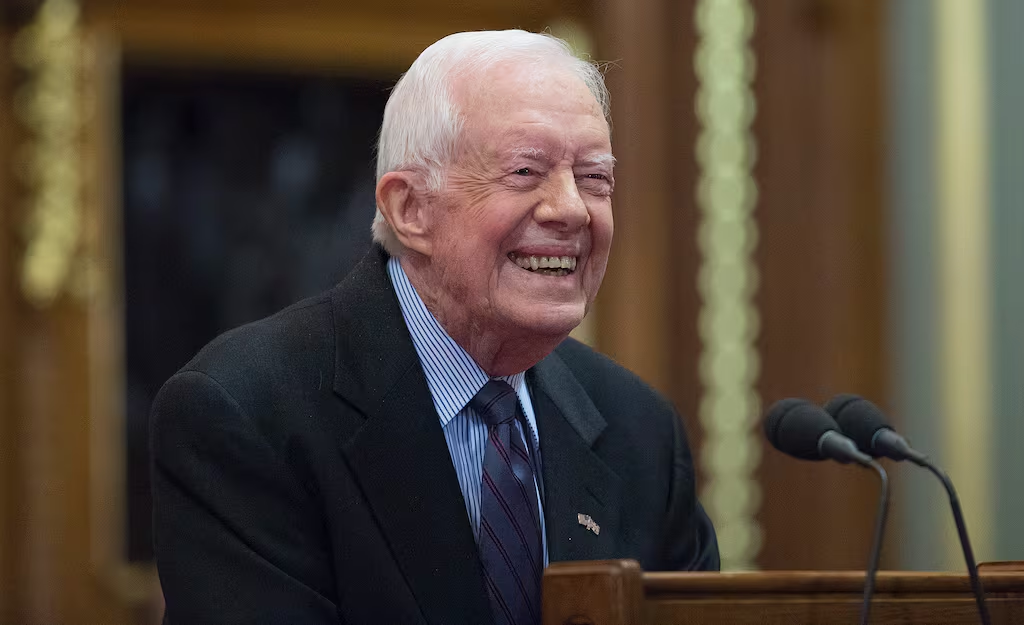On December 29, 2024, America bid farewell to a leader whose life embodied the ideals of humility, perseverance, and unwavering dedication to the betterment of humanity. Jimmy Carter, the 39th President of the United States, passed away peacefully at the age of 100 in his hometown of Plains, Georgia. As the longest-living U.S. president in history, Carter leaves behind a profound legacy of service and compassion that transcended politics and touched lives worldwide.
A Humble Beginning and a Journey of Duty
Born on October 1, 1924, in Plains, Georgia, James Earl Carter Jr. rose from modest beginnings to become a global statesman. His early years instilled in him a work ethic and resolve that carried him through a distinguished education at the U.S. Naval Academy, a successful naval career, and eventually, a return to his roots to manage the family peanut farm.
It was in Georgia’s fertile soil that Carter nurtured his ambitions for public service. From serving in the Georgia State Senate to becoming the 76th Governor of Georgia, he championed desegregation and equal rights, cementing his reputation as a leader of conscience and conviction.
The 39th President: Bridging Divides and Building Peace
Elected president in 1976, Carter’s tenure reflected his deep moral compass and commitment to justice. He tackled immense challenges, from domestic economic turmoil to international crises. Yet, his crowning achievement came in the form of the Camp David Accords, a groundbreaking peace treaty between Egypt and Israel. This historic agreement exemplified his ability to mediate, compromise, and inspire dialogue between adversaries.
Despite grappling with inflation, energy crises, and the Iran hostage situation, Carter’s presidency laid the groundwork for renewable energy initiatives and ethical governance, resonating with ideals still pursued today.
A Post-Presidential Renaissance: Humanitarianism at its Core
After leaving the White House, Carter embarked on a transformative chapter of public service. Alongside his wife, Rosalynn, he founded The Carter Center, a beacon of hope addressing global challenges like human rights abuses, disease eradication, and democracy promotion. The Center’s monumental efforts to nearly eliminate Guinea worm disease stand as a testament to the Carters’ unwavering dedication to alleviating suffering.
In 2002, Carter was awarded the Nobel Peace Prize, a fitting recognition of his lifelong devotion to peace, democracy, and social justice. Yet, he remained grounded, spending decades building homes with Habitat for Humanity and teaching Sunday school in his community church.
A Life Celebrated and a Legacy Eternal
Jimmy Carter’s 100th birthday in October 2024 was celebrated across the nation, reflecting the admiration he inspired. Tributes following his passing underscored his enduring influence. President Joe Biden called him an “extraordinary leader, statesman, and humanitarian,” while global leaders praised his lifelong pursuit of peace and progress.
Carter’s journey will culminate in a state funeral in Washington, D.C., and his final resting place will be beside Rosalynn, his beloved wife of 77 years, in Plains. Together, they epitomized a partnership rooted in love, faith, and service.
Inspiration for Generations
Jimmy Carter redefined the role of a former president, demonstrating that public service knows no bounds of time or office. His life was a testament to the belief that empathy and action can reshape the world. His legacy, rich in compassion and vision, will endure as a beacon for those who seek to make a difference.
May his memory serve as an enduring reminder of the profound impact of a life lived in service to others. Rest in peace, President Carter.









